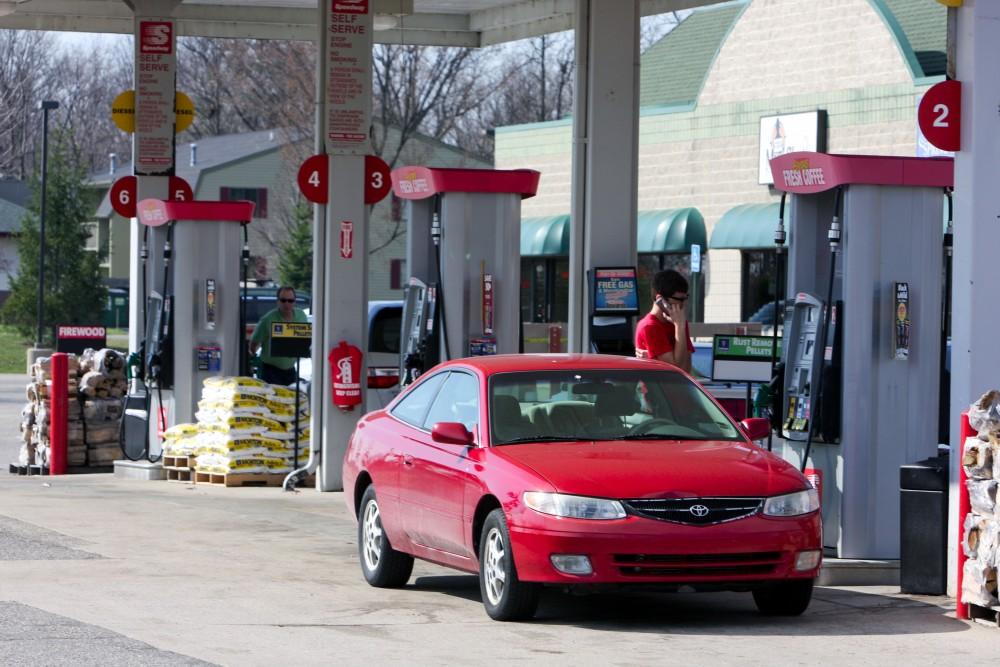GV deals with higher prices at the pump

GVL / Eric Coulter
Mar 19, 2012
With gas prices soaring well above $3 a gallon, it is no surprise that students and faculty members at Grand Valley State University are feeling the pinch. As their wallets get lighter, people are being forced to re-evaluate their expenses, and reports from the Natural Resources Defense Council (NRDC) indicated that the current hardship isn’t going to let loose anytime soon.
But even though students, faculty and staff still have to drop some major cash at the pump for their own cars, it isn’t all-bad for the university, who doesn’t have to dish out any extra money to fuel the buses.
This is because GVSU signs a yearly contract for a set price that covers the cost of labor, fuel, state funding and operational costs at the Rapid, said Mark Rambo, manager of Campus Operations.
“The contract establishes an annual ‘per hour’ rate for bus service,” Rambo said. “This rate is held constant throughout the year even if gas prices increase or decrease.”
Rambo said though, that it is conceivable that the set rate of buses may increase at the end of the contract year if the gas prices keep rising, but there is no talk of price changes at the moment. If the set rate does increase, though, students may feel a heavier financial burden in possible tuition increases.
As of now, many students are still tight on money and will be for a while since the only real solution for lowering gas prices, offered by NRDC, is to reduce the consumption and use other natural resources.
NRDC said the U.S. consumes 19 million barrels of oil each day, which equals 25% of the global supply.
Daniel Giedeman, an economics professor at GVSU, said decreasing the reliance on gas will be difficult because people have responsibilities requiring frequent travel.
“It is hard to reduce consumption; in the long run you could say ‘I’ll try to ride my bike more’ [but] there isn’t a great substitute for gas consumption, so it [will] take a while,” Giedeman said.
Junior Samantha Chandler said she has been taking the necessary steps to live a life without the dependence on a car since she was 14 years old. She began using her bike more often—for fun more so than out of necessity—but began to see that she was capable of living life without a car.
“Back home everything you need to buy you have to drive a car, so I started to ride my bike more,” Chandler said. “Looking back, I am glad I started to ride my bike places because it made me realize that I am able to live without a car. Plus now, it saves me money so that I am able to do something that maybe others who drive their cars often wouldn’t have the money to do.”
Chandler said she still owns a car but only uses it when necessary. Instead, she continues to ride her bike and walk the majority of the places she needs to go.
Giedeman offered no insight on why the gas prices seem to keep rising, but did say that it could be due to the fact that the economy is in its early stages of recovery.
“Gas prices were low three years ago because we weren’t using it,” he said. “Now the economy is recovering so the demand is going up, not just in the United States. We are in a global economy, and more people can afford to buy a car which increases the demand for gasoline.”
Giedeman said he does not know if the prices are expected to increase, but he said he does not expect them to drop anytime soon.
Senior Melissa Strowenjans said she has not had to change much about her lifestyle.
“Nothing has really changed about my parchases, but I try to put in a few more hours at work to make up the difference,” Strowenjans said. “It does not force me to work more hours, but I do just so that I don’t have to give up some of the things I enjoy.”
The only way Strowenjans has cut back has been not filling her tank up all the way. Chandler, however, has had to decrease the amount of money she spends on food.
“The only thing I cut back on was food because I don’t buy other things as often,” Chandler said. “I have to manage my money a lot better also and make sure I am not spending it frivolously.” Giedeman added that the gas prices will affect students a lot because they have to drive around a fair amount.
“Gas and food comprises a larger share of your budget than it does for other people,” he said. “Gas prices will cause food prices to rise more so than it would make television prices to rise.”
Giedeman and Chandler said despite the hassle associated with the gas prices, they are what they are and it is out of their control.
Giedeman also said that people should not blame the politicians either because they don’t have much control over the price – like the frustration with former president George W. Bush during the first gas price spike, and now with Barack Obama. However, Giedman said the issue is ‘beyond control’.
“This is the market for gasoline and it is what it is,” Giedeman said. “I am not happy about it but there is not much you can do about it other than adjust.”























